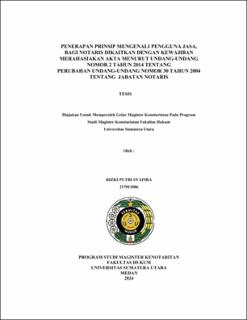| dc.description.abstract | A Notary is a public official vested with the authority to draw up authentic
deeds. The deeds prepared by a notary hold significant importance in obtaining legal
certainty, as they no longer require additional evidence and serve as a means to assert
rights within the legal framework. In carrying out their duties, notaries are designated
as reporting entities as stipulated in Article 3 of Goverment Regulation No 43 of 2015.
This categorization is due to the vulnerability of the notary profession to being utilized
by money laundering perpetrators to conceal, and safeguard their asssets from illegal
activities, thereby preventing detections by the Financial Transaction Reports and
Analysis Center (PPATK). The research problem in this study concerns the obligations
of Notaries in relation to Customer Due Diligence (CDD) associated with the duty to
maintain the confidentially of deeds, the implementation of CDD for Notaries, and the
legal protection afforded to Notaries in connection with the obligation to apply CDD
related to deed confidentially.
The research methodology employed is normative legal research of a
descriptive nature. Data for this study were obtained from secondary sources
encompassing primary secondary, and tertiary legal materials, supplemented by field
studies involving interview data.
The obligation of notaries of identify the principle of service users stems from
their obligations to report as stipulated in Article 3 of Regulation No. 43 of 2015, to
prevent money laundering crimes. Customer Due Diligence (CDD) must be
implemented by every Notary, and this does not contradict the confidentially of the
Notary’s duties, as CDD is applied for the benefit of the state and the protection of
Notaries, ensuring that their duties are not misused or exploited by service users
seeking to formalize transactions through authentic deeds, thereby legitimizing them as
logal entities. This Implementation is outlined in Minister of Law and Human Rights
Regulation Number 9 of 2017, Article 2 paragraph (1), which includes, at minimum, the
identification, verification, and monitoring of service user transactions. Legal
protection for Notaries regarding the obligation to apply CDD is governed by the
Republic of Indonesia Law Number 8 of 2010 concerning the Prevention and
Eradication of Money Laundering Crimes, specified in Chapter IX, Articles 83-87. In
performing their duties, Notaries are required to exercise CDD with caution, verifying
documents provided by Servuce Users/ Applicants, and it is hoped that the Goverment,
especially the Ministry of Law and Human Rights, can provide specific protection to
Notaries in implementing CDD related to Deed Confidentially. | en_US |


